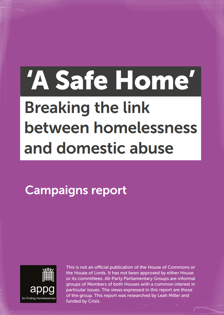A new report published today by Crisis and the All-Party Parliamentary Group for Ending Homelessness (APPGEH) has shown that people fleeing domestic abuse in England are being left at risk of homelessness because local authority rules state they aren’t vulnerable enough for help with finding permanent housing. 
A Safe Home: Breaking the link between homelessness and domestic abuse showed that in any given year, an estimated 1,960 households fleeing domestic abuse in England are not being provided with a safe home by their local authority housing teams because under the current system, not everyone fleeing domestic abuse in England is considered in ‘priority need.’
Faced with the prospect of nowhere to turn, many survivors have no option but to return to their abusers or face the dangers of homelessness. The findings – based on an FOI of 168 councils across the country – paint a bleak picture of the harrowing situation people experiencing abuse are left in.
We know that there is strong relationship between domestic abuse and homelessness – particularly so for women. Official figures released from the Government last week show the number of people who have become homeless because of domestic abuse is alarmingly high.
In 2018, 5,380 households were made homeless in England over a three-month period directly because of domestic abuse.
Our own Crisis services support hundreds of survivors each year, with one in five of the women we work having had their homelessness caused by domestic abuse.
However, under the current rules in England, people fleeing domestic abuse have to demonstrate not only that they have experienced domestic abuse and are homeless, but that they are more vulnerable than “ordinary” person facing homelessness in order to access a safe and settled home- creating an incredibly high bar to overcome. Providing evidence to prove vulnerability can be traumatic and near impossible for people.
During the APPG’s 2017 inquiry into prevention, we heard of one woman being told to return home to get a letter from the perpetrator stating he had raped and attacked her. In some cases, survivors are also being asked to provide a criminal reference number. This is inappropriate as many survivors do not want to report abuse to the police. It could also result in survivors staying in a dangerous situation until it escalates and the police become involved.
Recent research by Women’s Aid found that nearly one quarter of survivors supported through their No Woman Turned Away project, who were prevented from making a valid homelessness application, were turned away as they were told they would not be in priority need.
What’s the solution?
The APPG and Crisis believes that everyone who experiences domestic abuse is, by definition, vulnerable and should be placed in the automatic priority need category if they become homeless.
We strongly welcome the new emphasis that the Homelessness Reduction Act (2017) places on prevention and would expect that as far as possible local authorities would be working with people who have experienced or are at risk of domestic abuse to prevent their homelessness occurring in the first place.
However, homelessness cannot always be prevented, and this is especially true for survivors of domestic abuse who often present at a time when they have fled a dangerous situation and would be putting themselves at risk by returning home. It is therefore essential that automatic priority need for settled accommodation is extended to survivors of domestic abuse to plug this crucial gap in support under the current homelessness legislation and ensure greater consistency across local authorities with regards to the offer that’s being provided to people.
What next?
Crisis and the APPGEH are calling on the Government to urgently amend the Domestic Abuse Bill so that it extends priority need status to people who are homeless because of domestic abuse, guaranteeing them a safe and settled home.
New proposals set out the Government’s intention to place a new legal duty on upper tier local authorities to convene boards to assess the need for support and accommodation based services for people experiencing domestic abuse. However, the case remains that without a change to the homelessness legislation, there is still no legal duty to provide everyone who is homeless as a result of domestic abuse with a safe and settled home. Last week, we gave evidence to the parliamentary joint committee scrutinising the draft domestic abuse bill setting out our position:
What can you do?
There is still time for the joint committee of politicians scrutinising at the draft Domestic Abuse Bill to make recommendations for an amendment- you can show your support for the campaign on social media using the hashtag #ASafeHome.
You can also sign up as a Crisis campaigner, and look out for our response to the Government’s new consultation on support for people experiencing domestic abuse, which closes on 2 August, and ways to get involved.
For media enquiries:
E: media@crisis.org.uk
T: 020 7426 3880
For general enquiries:
E: enquiries@crisis.org.uk
T: 0300 636 1967



